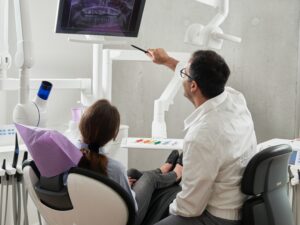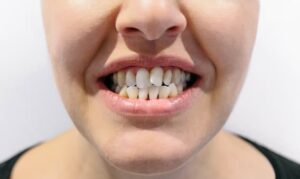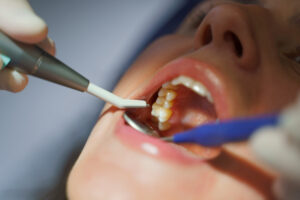Invisalign has become one of the most popular orthodontic treatments for straightening teeth. Instead of traditional braces, Invisalign uses clear, removable aligners to gently shift teeth into their proper position. But can Invisalign handle all types of dental issues, including crowded teeth?
This article will answer whether Invisalign can fix very crowded teeth, the challenges involved, and who might not be eligible for this treatment.
Can Invisalign Fix Very Crowded Teeth?
![]()
The short answer is yes, Invisalign can fix crowded teeth. However, the effectiveness depends on the severity of the crowding.
What Is Crowding?
Crowding happens when there isn’t enough space in your mouth for all your teeth to fit properly. This can cause teeth to overlap, twist, or appear crooked.
How Invisalign Works for Crowding
Invisalign aligners are custom-made to gradually shift your teeth into better alignment. They work well for mild to moderate crowding by:
- Widening the dental arch to create more space
- Moving teeth individually to their correct position
- Addressing overlapping and twisting
When Invisalign Works Best
Invisalign is especially effective for cases where:
- Crowding is minor to moderate
- Teeth require small, precise movements
- There is no underlying issue like severe jaw misalignment
However, very crowded teeth may require additional steps or treatments before Invisalign can be effective.
What Teeth Are Hardest to Move with Invisalign?
While Invisalign is a versatile tool, some teeth present more challenges than others:
1. Rotated Teeth
Teeth that are severely rotated—more than 20 degrees—can be difficult to correct with Invisalign alone. Braces or other treatments may be required first.
2. Teeth Tilted Vertically
If a tooth is leaning too far forward or backward, Invisalign might struggle to move it into place.
3. Molars
Molars (the large teeth at the back of your mouth) can be harder to shift due to their size and position. However, with attachments (small tooth-colored bumps placed on teeth), Invisalign can often manage these movements.
4. Teeth with Deep Crowding
When teeth overlap significantly or are buried deep in the dental arch, creating enough space for movement may require additional procedures like tooth extraction or interproximal reduction (removing a tiny bit of enamel between teeth).
Who Is Not Eligible for Invisalign?

Invisalign is a great option for many people, but it’s not suitable for everyone. Certain factors might make you ineligible or require alternative treatment:
Severe Orthodontic Issues
Invisalign may not be the best choice for:
- Severe crowding or spacing issues
- Complex bite problems like overbites, underbites, or crossbites
Traditional braces are often better for these cases because they provide more control.
Children or Teens with Growing Jaws
For children whose teeth and jaws are still developing, braces might be a better choice. Invisalign can still work for teens, but they need to be disciplined about wearing their aligners for 20–22 hours a day.
Poor Oral Hygiene
Aligners need a clean, healthy mouth to work effectively. People with untreated cavities, gum disease, or poor oral hygiene may need to address these issues before starting Invisalign.
Inconsistent Wear
Invisalign aligners must be worn nearly all the time to be effective. If you frequently forget to wear them or remove them too often, the treatment may not succeed.
Missing or Severely Damaged Teeth
People with missing teeth or extensive dental damage may need implants, bridges, or other restorative treatments before starting Invisalign.
What Teeth Are Too Bad for Invisalign?
In some cases, teeth may be considered “too bad” for Invisalign alone. These situations include:
1. Severe Crowding
If your teeth are extremely crowded, Invisalign may not be able to create enough space on its own. This could require:
- Tooth extraction
- Expansion of the dental arch with braces or other devices
- Using braces first, followed by Invisalign for fine-tuning
2. Major Bite Problems
If you have a significant overbite, underbite, or crossbite that affects your jaw alignment, Invisalign may not be the best solution. These issues often require braces, surgery, or both.
3. Impacted Teeth
An impacted tooth is one that hasn’t fully emerged from the gumline. This is common with wisdom teeth but can also happen with other teeth. Invisalign can’t move impacted teeth into position.
4. Teeth with Bone Loss
If you have advanced gum disease or significant bone loss around your teeth, the underlying support structure may not be strong enough for Invisalign to work.
5. Large Gaps or Missing Teeth
While Invisalign can handle small gaps, large spaces or multiple missing teeth may require additional dental work, such as implants or bridges, before aligners can be used.
How to Know If Invisalign Is Right for You

The best way to determine if Invisalign is the right treatment is to consult with an orthodontist. They’ll evaluate your teeth and discuss your options based on your specific needs.
Here’s what you can expect during an Invisalign consultation:
- X-rays and Impressions: Your orthodontist will take images and impressions of your teeth to assess your alignment.
- Treatment Plan: They’ll create a personalized plan showing how your teeth will move over time with Invisalign.
- Alternative Options: If Invisalign isn’t suitable, they’ll recommend alternative treatments like braces or other orthodontic devices.
Conclusion
Invisalign can fix crowded teeth, but its effectiveness depends on the severity of the crowding and the specific teeth involved. While mild to moderate cases are often treatable with Invisalign, severe issues may require additional procedures or alternative treatments.
The best way to find out if Invisalign is right for you is to visit an orthodontist. With the right care and guidance, you’ll be on your way to a straighter, healthier smile—whether through Invisalign or another solution.
















